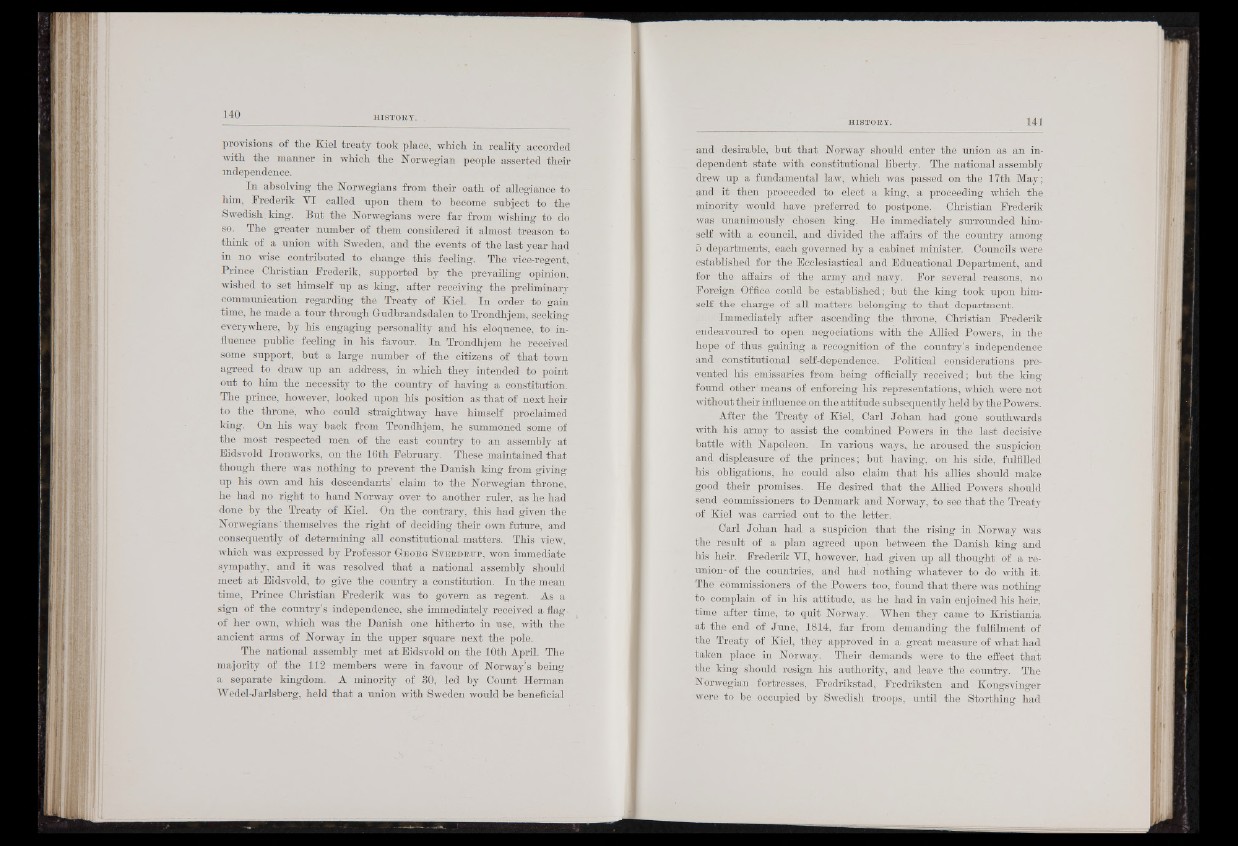
provisions of the Kiel treaty took place, which in reality accorded
with the manner in which the Norwegian people asserted their
independence.
In absolving the Norwegians from their oath of allegiance to
him, Frederik VI called npon them to become snbject to the
Swedish; king. But the Norwegians were far from wishing to do
so. The greater number of them considered it almost treason to
think of a union with Sweden, and the events of the last year had
in no wise contributed to change this feeling. The vice-regent,
Prince Christian Frederik, supported by the prevailing opinion,
wished to set himself up as king, after receiving the preliminary
communication regarding the Treaty of Kiel. In order to gain
time, he made a tour through Gudbrandsdalen to Trondhjem, seeking
everywhere, by his engaging personality and his eloquence, to influence
public feeling in his favour. In Trondhjem he received
some support, but a large number of the citizens of that town
agreed to draw up an address, in which they intended to point
out to him the necessity to the country of having a constitution.
The prince, however, looked upon his position as that of next heir
to the throne, who could straightway have himself proclaimed
king. On his way back from Trondhjem, he summoned some of
the most respected men of the east country to an assembly at
Eidsvold Ironworks, on-the 16th February. These maintained that
though there was nothing to prevent the Danish king from giving
up his own and his descendants’ claim to the Norwegian throne,
he had no right to hand Norway over to another ruler, as he had
done by the Treaty of Kiel. On the contrary, this had given the
Norwegians'themselves the right of deciding their own future, and
consequently of determining all constitutional matters. This view,
which was expressed by Professor G e o r g S v e r d r u p , won immediate
sympathy, and it was resolved that a national assembly should
meet at Eidsvold, to give the country a constitution. In the mean
time, Prince Christian Frederik was to govern as regent. As a
sign of the country’s independence, she immediately received a flag
of her own, which was the Danish one hitherto in use, with the
ancient arms of Norway in the upper square next the pole.
The national assembly met at Eidsvold on the 10th April. The
majority of the 112 members were’ in favour of Norway's being
a separate kingdom. A minority of 30, led by Count Herman
Wedel-Jarlsberg, held that a union with Sweden would be beneficial
and desirable, but that Norway should enter the union as an independent
state with constitutional liberty. The national assembly
drew up a fundamental law, which was passed on the 17th May;
and it then proceeded to elect a king, a proceeding which the
minority would have preferred to postpone. Christian Frederik
was unanimously chosen king. He immediately surrounded himself
with a council, and divided the affairs of the country among
5 departments, each governed by a cabinet minister. Councils were
established for the Ecclesiastical and Educational Department, and
for the affairs ..of the army and navy. For several reasons, no
Foreign Office could be established; but the king took upon himself
the charge of all matters belonging to that department.
Immediately after ascending the throne, Christian .Frederik
endeavoured to open négociations with the Allied Powers, in the
hope of thus gaining n. recognition of the country’s independence
and constitutional self-dependence. Political considerations prevented
his emissaries from being officially received; but the king
found other* means of enforcing his representations, which were not
without their influence on the attitude subsequently held by the Powers.
After the Treaty of Kiel, Carl Johan had gone southwards
with his army to assist the combined Powers in the last decisive
battle with Napoleon. In various ways, he aroused the suspicion
and displeasure of the princes; but having, on his side, fulfilled
his obligations, he could also claim that his allies should make
good their promises. He desired that the Allied Powers should
send commissioners to Denmark and Norway, to see that the Treaty
of Kiel was carried out to the letter.
Carl Johan had a suspicion that the rising in Norway was
the result of a plan agreed upon between the Danish king and
his heir. Frederik VI, however, had given up all thought of a reunion
of the countries, and had nothing whatever to do with it.
The Commissioners of the Powers too, found that there was nothing
to complain of in his attitude, as he had in vain enjoined his heir,
time after time, to quit Norway. When they came to Kristiania
at the end of June, 1814, far from demanding the fulfilment of
the Treaty of Kiel, they approved in a great measure of what had
taken place in Norway. Their demands were to the effect that
the king should resign his authority, and leave the country. The
Norwegian fortresses, Fredrikstad, Fredriksten and Kongsvinger
were to be occupied by Swedish troops, until the Storthing had